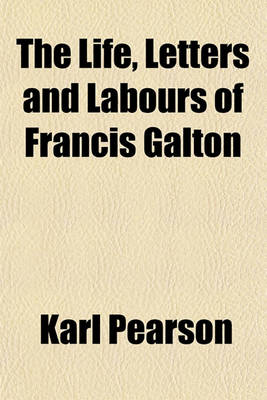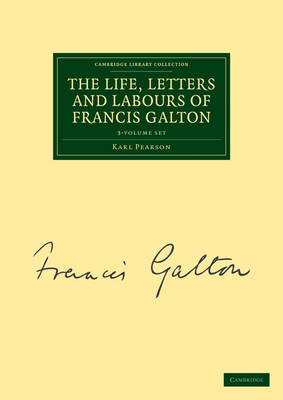Cambridge Library Collection - Darwin, Evolution and Genetics
4 primary works • 5 total works
Volume 1
The Life, Letters and Labours of Francis Galton: Volume 1, Birth 1822 to Marriage 1853
by Karl Pearson
Published 2 June 2011
A controversial figure, Sir Francis Galton (1822–1911), biostatistician, human geneticist, eugenicist, and first cousin of Charles Darwin, is famed as the father of eugenics. Believing that selective breeding was the only hope for the human race, Galton undertook many investigations of human abilities and devoted the last few years of his life to promoting eugenics. Although he intended his studies to work positively, for eradicating hereditary diseases, his research had a hugely negative impact on the world which subsequently bestowed on Galton a rather sinister reputation. Written by Galton's colleague, eugenicist and statistician Karl Pearson (1857–1936), this four-volume biography pieces together a fascinating life. First published in 1914, Volume 1 covers the years from Galton's birth in 1822 to his marriage to Louisa Jane Butler in 1853. Pearson himself was later appointed the first Galton professor of eugenics at University College London.
Volume 2
A controversial figure, Sir Francis Galton (1822-1911), biostatistician, human geneticist, eugenicist, and first cousin of Charles Darwin, is famed as the father of eugenics. Believing that selective breeding was the only hope for the human race, Galton undertook many investigations of human abilities and devoted the last few years of his life to promoting eugenics. Although he intended his studies to work positively, for eradicating hereditary diseases, his research had a hugely negative impact on the world which subsequently bestowed on Galton a rather sinister reputation. Written by Galton's colleague, eugenicist and statistician Karl Pearson (1857-1936), this four-volume biography pieces together a fascinating life. First published in 1924, Volume 2 focuses on Galton's 'researches of middle life', including his anthropological research and psychological experiments. Pearson himself was later appointed the first Galton professor of eugenics at University College London.
Volume 3
A controversial figure, Sir Francis Galton (1822–1911), biostatistician, human geneticist, eugenicist, and first cousin of Charles Darwin, is famed as the father of eugenics. Believing that selective breeding was the only hope for the human race, Galton undertook many investigations of human abilities and devoted the last few years of his life to promoting eugenics. Although he intended his studies to work positively, for eradicating hereditary diseases, his research had a hugely negative impact on the world which subsequently bestowed on Galton a rather sinister reputation. Written by Galton's colleague, eugenicist and statistician Karl Pearson (1857–1936), this four-volume biography pieces together a fascinating life. First published in 1930, this second part of Volume 3 includes records of Galton's travels and occupations, and recollections of friends and family. Pearson himself was later appointed the first Galton professor of eugenics at University College London.
Volume 3
A controversial figure, Sir Francis Galton (1822–1911), biostatistician, human geneticist, eugenicist, and first cousin of Charles Darwin, is famed as the father of eugenics. Believing that selective breeding was the only hope for the human race, Galton undertook many investigations of human abilities and devoted the last few years of his life to promoting eugenics. Although he intended his studies to work positively, for eradicating hereditary diseases, his research had a hugely negative impact on the world which subsequently bestowed on Galton a rather sinister reputation. Written by Galton's colleague, eugenicist and statistician Karl Pearson (1857–1936), this four-volume biography pieces together a fascinating life. First published in 1930, the first part of Volume 3 focuses on Galton's later research on correlation, personal identification, and eugenics. Pearson himself was later appointed the first Galton professor of eugenics at University College London.
The Life, Letters and Labours of Francis Galton 3 Volume Set in 4 Pieces
by Karl Pearson
Published 7 April 2011
A controversial figure, Sir Francis Galton (1822-1911), biostatistician, human geneticist, eugenicist, and first cousin of Charles Darwin, is famed as the father of eugenics. Believing that selective breeding was the only hope for the human race, Galton undertook many investigations of human abilities and devoted the last few years of his life to promoting eugenics. Although he intended his studies to work positively, for eradicating hereditary diseases, his research had a hugely negative impact on the world which subsequently bestowed on Galton a rather sinister reputation. Written by Galton's colleague, eugenicist and statistician Karl Pearson (1857-1936), this four-volume biography pieces together a fascinating life. Volumes 1 and 2 are primarily biographical. Volume 3, published in two parts, focuses on Galton's later research on correlation, personal identification, and eugenics, and includes records of Galton's travels and occupations, and recollections of friends and family.


